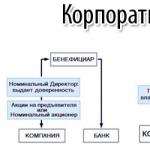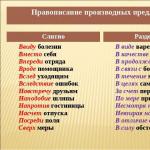1. What do prepositions and conjunctions have in common and how do they differ from each other?
Prepositions and conjunctions belong to the auxiliary parts of speech and serve for communication. However, prepositions connect words in a phrase, and conjunctions connect homogeneous members and parts of a complex sentence.
2. Which prepositions are called derivatives and which ones are called non-derivative?
Non-derivative prepositions are not formed from anything, but derivatives are formed from other parts of speech, for example from nouns: during (noun flow), about (noun account) - derived prepositions; in, from – non-derivative prepositions.
3. How do compound prepositions and conjunctions differ from simple ones?
Compound prepositions and conjunctions consist of two or more words (for, in order to), and simple ones - of one word (about, in order to).
4. Tell us about combined and separate spellings of prepositions.
Derivative prepositions can be written together or separately. Their spelling must be remembered or found in a dictionary. The prepositions during and in continuation are written separately; together - prepositions due to, about, in view of, etc.
5. Give examples of prepositions that are written with a hyphen.
The prepositions due to, from under, on-over are written with a hyphen.
6. How to distinguish the prepositions during, in continuation, due to from nouns with a preposition?
There are several ways to distinguish a preposition from a noun.
Firstly, turning into a preposition, the word loses its lexical meaning. For example, during the week - but the week doesn’t flow anywhere. Therefore, it is a preposition, not a noun (cf. in the flow of a river)
Secondly, you cannot pose a question to a preposition, but you can to a noun.
Thirdly, the preposition can be replaced with a synonymous preposition: during the week - during the week.
Fourthly, you can choose a dependent adjective for a noun, but not for a preposition. In the continuation of the novel - in a new continuation of the novel (this is a noun); for an hour - - (this is a preposition).
7. Which conjunctions serve to connect sentences and homogeneous members, and which ones only serve to connect sentences?
Coordinating conjunctions serve both to connect homogeneous members and to connect sentences within a complex sentence. And subordinates are only used to connect sentences.
8. What groups are coordinating conjunctions divided into?
Coordinating conjunctions can be connecting (and, yes in the meaning and, also, etc.), disjunctive (or, either, either... either, etc.) and adversative (a, but, yes in the meaning but, however, etc.)
9. Give three examples of sentences with conjunctions also, also, but.
The hare changed his coat, the squirrel also became gray. The father studied well, his son is also an excellent student. I was late, and so was Petya.
Tomorrow I will also wear a red dress. We bought milk, and so did the old lady. I love to dance, Olya is also a fan of this art.
He's stupid, but he's handsome. I arrived early, but had time to talk with the professor. He loved biology, but hated physics.
10. How to distinguish in writing the conjunction so from the pronoun that with the particle would?
The particle BY can be rearranged to another place in the sentence.
I didn't know what that meant. “I didn’t know what that meant.”
The conjunction SO can be replaced by the conjunction IN ORDER.
I came into this world to disagree. – I came into this world in order to disagree.
Objectives: to show the conditions for choosing combined and separate writing of derivative prepositions; teach to distinguish derivative prepositions from independent parts of speech; develop sentence analysis skills.
Methodological techniques: analysis of essays, teacher explanations, elements of comparative analysis, exercises, vocabulary work, linguistic analysis, independent work.
Lesson progress 1
Sh. Reading and discussion of several creative works
II. Learning new material
1. The teacher's word.
The most important thing in this topic is to learn to correctly determine the part of speech, and this, as we know, is only possible in context, in a sentence. Let’s compare the sentences and write them down on the board and in notebooks:
Along the course of this mountain river there are many impassable rapids.
During our peaceful life, alarming news suddenly burst in.
You must complete the test within an hour.
By ear, the first words of each sentence are exactly the same. Let's see which members of the sentence these first words depend on, highlight the phrases, and determine the case where possible:
Found where? during (prepositional case of the noun during). We are talking about the flow of a river.
Burst where? during (accusative case of the noun during). It's about the flow of life.
Decide when? in what time? In one hour. It's about time. The expression can be replaced by a synonymous combination with the preposition: in an hour.
Conclusion: in the third case we have a preposition formed from a combination of a noun and a preposition.
A preposition is an unchangeable auxiliary part of speech, which means it is always written the same way; you can often find a synonymous preposition for it: during the day (for a day), during the life (for life), for some time (for some time). It is clear that the preposition has a temporary meaning. A preposition cannot be posed with a question; it is not a member of a sentence. Please note that the letter e is written at the end of this derived preposition.
Let's try to replace the first words of the second sentence with a combination with the preposition: for life - the sentence has lost its meaning. Let's replace the second sentence with a synonymous one:
The course of our peaceful life was unexpectedly changed by alarming news.
Having analyzed one example in detail, we received the key to the logical reasoning necessary when analyzing sentences and the words from which they consist.
Let us only mention that derived prepositions formed on the basis of adverbs are written together: run ahead of the locomotive (in front of the locomotive), pedestrians went out to meet each other (towards each other). You will have to remember the combined and separate spelling of derivative prepositions.
2. Independent reading and study of the theoretical material of the textbook § 53, p. 142-143.
3. Vocabulary work.
Let's write down the prepositions from § 53 into dictionaries and make up phrases with them:
We headed towards the arrivals; crop failure due to drought; dish-like antenna; tree root like horns; talk about hiring; refuse due to lack of space; wash the dishes for me; won despite strong enemy resistance.
Apart:
I'll write during the day; Let's get to know each other better as we continue our journey; was late due to a bus breakdown; wrapped the wire with electrical tape for safety purposes; wind from the sea.
III. Doing exercises
1. Exercise 308: commented letter (performed on the board and in notebooks); explanation of spellings; word-formation analysis and analysis according to the composition of the word danger.
2. Exercise 309: commented letter; application of knowledge on syntactic synonymy.
Homework 1- § 53.
2. Exercise 311.
Lesson progress 2
I. Linguistic warm-up
In the last lesson we talked about synonymous prepositions. Are there antonym prepositions? Give examples of both. Synonymous prepositions: as a result - because of; about - at, during - in continuation, for; like - like; towards - towards; from the side - from; behind - behind; thanks - because of, etc.
Antonym prepositions: with - without; from - to; above under; before - behind; before after; to-otchg. d.
II. Checking homework
1. Talk about cases of combined and separate writing of derivative prepositions.
2. Exercise 311: checking the spelling of words with spelling chains.
At this time, the student writes down phrases on the board, in which the dependent word is attached to the main word using a preposition.
A comment. Dragged ashore; formed on the sand;); to do in this weather; rushing from the hills; rushing into the void; being outdoors; lured out of the house; went to Moscow
laid out in rows; naked near the shores; keeping up with the waves; they ran with a roar; ran towards the horizon; rushing in despair; rushing towards consolation.
III. Vocabulary work
Write down the words placed in the frames at 143-144, make up
suggestions with them.
Subsequently, fantasy.
IV. Independent work
Open the brackets, insert the missing letters and symbols
punctuation, make a morphological analysis of prepositions.
(Sentences are written on the board.)
Note: After completing the work, there is a debriefing in class.
(On) the eve...cha professional (s, her)... disgraced dog psychologist pr...glas...(n, nn)y trainer... rum in (z, s) had a detailed talk with the football players boron is still... in the past with... the zone.
Thanks to the fabulous... narration... the reader develops confidence in the veracity of the story...
Only on smooth surfaces apply paint...evenly without streaks and drips (so) the preparation of the walls should be very thorough.
On the eve of the match, a professional psychologist, invited by the coach to the national team last season, had a detailed conversation with the players.
Thanks to the fairy tale narration, the reader becomes confident in the veracity of the story told.
Only on smooth surfaces does the paint apply smoothly, without streaks or drips, so the preparation of the walls must be very careful. Homework
2. Exercise 310.
3. Preparation for practical work.
Objectives: test the ability to distinguish derived prepositions from independent parts of speech; develop sentence analysis skills, spelling and punctuation skills.
Methodological techniques: free dictation, practical work, linguistic analysis.
Progress of lessons
I. Free dictation (based on exercise 311)
II. Practical work
1. Write down prepositions: the first option is derivatives, the second
option - non-derivatives:
Come in a week, dance around the tree, look under the ground, get it out of the ground, relax near the river, just for you, look out from behind the tree, walk along the street, built along the... among the old houses, clouds over the city, do it during the day, go without lunch, agree on additional classes, cancel classes due to frost.
(Derivatives: around, about, along, in the middle, during, about, : in connection. Non-derivatives: through, under, from under, for, because of, over, without.)
2. Write down phrases in two columns: the first - with derived prepositions, the second - with other parts of speech.
Option 1
1) introduce new actors to continue the series; I 2) receive a reprimand due to being late;
3) they differ in kind and case;
4) wait for 24 hours; Option 2
1) keep in mind
2) a toy like a construction set;
3) rest for a week,
4) intervene in the flow of thoughts. Answers:
With derivative prepositions
With other parts of speech
Option 1
Option 2
3. Open the brackets, insert the missing letters and punctuation marks, and make a morphological analysis of prepositions. (Sentences are written on the board.)
Option 1
(As a) consequence... of an injury to the best bomb...rdir of...the wrestling tournament forced...(n.nn)ogo to miss the next two ma...cha training... The team replaced him with a young player.
Option 2
(Not, not) despite the (not, not) luck of our team in a series of matches, the goal (still) remains achievable.
Option 1: Due to an injury to the top scorer of the qualifying tournament, who was forced to miss the next two matches, the coaches replaced him with a young player.
Option 2: Despite the failure that befell our team in a series of matches, the goal remains achievable.
4. Come up with sentences in which identical-sounding words would be different parts of speech:
Option 1: like - like.
(For example: I was interested in some strange object like a cube. We were solving a problem like triangles.)
Option 2: instead - in place.
(For example: Instead of a performance announced in advance, another play was performed. We arrived at a place very similar to a fairy-tale town.)
In this article, we will plunge into learning the Russian language and take another small step towards acquiring new knowledge. We will consider combined and separate writing of prepositions. And based on the examples given, we will clearly see the difference between the preposition and other parts of speech.
The concept of preposition
The auxiliary part of speech is a preposition, the functional feature of which is to express the dependence of a word on another word or on a group of them. Serves as a pretext for connecting words in sentences.
Derivative and non-derivative prepositions
Prepositions are called derivatives if they were formed by moving from independent to auxiliary parts of speech. Thus, the first of them lose their morphological characteristics and lexical meaning.
And prepositions are considered non-derivative if there was no named transition. The following prepositions are written separately:
- on the shore;
- to a friend;
- from the ship and so on.

Writing derived prepositions
A preposition is an important part of speech, without which it is quite difficult to imagine full-fledged communication. This is an obligatory component that is very, very often found in conversation and more. We will look at the combined and separate spelling of the prepositions “as a result” and “as a consequence”.
The preposition “due to” is written together if there is a causal relationship and this word can be replaced in the text with a synonym “due to” without losing its semantic meaning:
- Due to the fact that there was little work left, Ivan was in no hurry.
The word is written separately if it is a noun in the text:
- The investigation into theft charges lacked direct evidence.
Now let’s look at another pair: “in view” and “in view”. In view of written together, if there is meaning. That is, this word can be replaced with a synonym “because of”:
- Nikolai felt a certain respect for the person sitting next to him, due to the fact that he behaved quietly and reservedly.
It is written separately, firstly, when using the stable expression “to keep in mind”, and secondly, if spatial meaning is embedded in the phrase ( nearby, nearby):
- The boat floated along the quiet river in sight of (near, near) the shore.
The words “about” and “at the expense” are written together when synonymous prepositions “about”, “about” can be used:
- And I would like to talk about Fedor.
It is written separately if it is a noun in the text:
- A large amount of money was transferred to the bank account.

Now consider the words “despite” and “despite”. Participle with Not are written separately - this is the main rule, and prepositions are written together if the nature of the sentence has a concessive meaning:
- Despite (you can replace “despite”) fatigue, we climbed to the top of the hill with great pleasure.
Example with participial phrase:
- Without looking around, the guy confidently approached the stage.
We can write “like” and “like” together and replace them with the synonym “like”:
- Something like melancholy touched my soul.
But the preposition “like” should not be confused with a noun (in gender) with a preposition.
"After" or "in the wake"? We write together if the preposition can be replaced with a synonym “after”:
- Following the passing years, I shout loudly: “Don’t!”
And the combination “in the wake” can be a noun with a preposition:
- The dog barked loudly as soon as he touched the trail of this animal with his nose.
“Towards” and “to meet” you also need to be able to distinguish by belonging to different parts of speech:
- A stranger comes towards him from a dark alley.
You can distinguish in the following way: we write separately, if you mentally separate this word and insert an adjective that suits its meaning:
- I will definitely go to (this) alumni meeting.
“In the middle” or “in the middle” is used to express a spatial relationship; continuous and separate spelling depends on your ability to distinguish a noun with a preposition from a preposition. An example of spelling prepositions looks like this:
- I saw a clearing illuminated by the sun, in the middle of which grew a huge oak tree.
Let's give an example with a noun:
- A line was drawn along (you can mentally add a word with a suitable meaning, for example “the very”) middle of the hall.
In order not to be mistaken in the words “like” and “like”, you can try to use the synonym “like”; if it fits, then write it together:
- A bird suddenly flew out from behind a bush, like an owl.
For greater clarity, we offer you a table of writing prepositions.
| Continuous writing: | Separate writing: |
due to | |
like | |
in the middle | |
towards | from the outside |
during |
|
Finally |
|
in continuation |
|
because of |
|
on both sides |
How does the element under study differ from other parts of speech?
In order to write a word correctly, you must be able to distinguish it from those parts of speech from which it was formed. These parts of speech can be an adverb, a noun, or a gerund. We consider with examples the combined and separate writing of prepositions.
And first of all, let us pay attention to the fact that a preposition cannot be a member of a sentence, but it is certainly included in a question that can be asked from one word to another. Let's take a simple example:
- I wanted to ask about the order. I wanted to ask (about what?) about the order.
Let's look at "during" and "during". Both the preposition and the noun with the preposition are written separately. Mistakes are usually made at the end of these words:
- She worked hard for a month.
That is, how long did you work? This refers to the amount of time. The preposition "during" ends in -e.
- There are many pitfalls along the river.
If you can add an adjective to a word (in strong flow of the river), then we have a combination of a noun and a preposition. That is, “during” is a neuter noun used in the prepositional case. It ends in -i.
Now let's look at the spelling of prepositions that need to be distinguished from gerunds:
- The boy ran skipping, not looking at his feet.
“Despite” is a gerund and answers the question - what by doing? “Not” with gerunds is written separately.
- We went to the sea, despite the bad weather.
“Despite” acts as a preposition, and it can be replaced with the combination “in spite of something.”
And in the end, we note the differences between the element we are studying and the adverb.
- Motorcyclists with flags moved ahead of the column.
In this sentence, “in front” is a preposition corresponding in meaning to the words “in front of something” or “in front of someone.”
- Everything ahead was covered in fog.
And in this sentence “in front” is an adverb and answers the question - where?

Conclusion
Based on the given examples of a comparative nature, the differences between prepositions and other parts of speech are shown, and the rules for writing prepositions together and separately are considered. We have summarized the writing rules in a table, which greatly facilitates the perception of new material.
Spelling patterns and rules for spelling prepositions. Integrated and separate writing of prepositions….
Spelling chart No. 7 with other words are written separately: on river (pr., noun); on you (ex., place); To five (regular number).
Between and with a word you can insert a question or word: on(what?) sky or on(blue) sky.
Spelling chart No. 65 Derived prepositions formed on the basis of adverbs are written together: go towards
(from adverb) fate. Some prepositions and adverbs are functional homonyms. It is necessary to distinguish between prepositions and adverbs: Used without a noun - adverb, with a noun (or pronoun) - preposition. Look around(adverb) - look around yourself (preposition);
go towards(adverb) - go towards friends (preposition) Spelling No. 66 The following derivative prepositions are written together:
- in view of(= because of, = because of),
- like(= similar)
- about(= about, about).
- instead of, like, as a result of(= for a reason) above
To make sure that we are dealing with a derived preposition and not another part of speech, we must try to replace this preposition with a preposition synonymous with it, the semantic meaning will not change:
Because of We didn't go hiking. = Because of We didn't go hiking.
Get sick during weeks (= in continuation).
Spelling chart No. 67 In prepositions during, in continuation, as a result of at the end it is written e (since they were formed from the accusative case form): during lesson, in continuation classes, due to illnesses. Combinations with during, in continuation always have a time value and answer the question how long?. These prepositions can replace each other. They should be distinguished from combinations of nouns in the prepositional case, with the preposition V. In combinations between a noun and a preposition, it is possible to substitute a definition: V brief conclusion, V upper flow rivers, V this continuation ; In addition, the noun requires a dependent word after itself in the genitive case: in custody articles, in continuation novel. Paired prepositions of adhesion because of, from under and vernacular over, over, for-sake, for-sake are written with a hyphen. Because of The sun came out from the clouds. From under A dog jumped out of the porch.
About some prepositions.
- Withthrough has at the end b : We made our way through dense thickets.
- near written without b:Near there was construction at home. Note writing close — only for a noun : you can’t tell where the distance is, where close.
- thanks, according to control the dative form of a noun or pronoun: thanks to the care, according to the schedule. The genitive case form of nouns is not used after these prepositions.
Continuous writing of derivative prepositions
- In view of - written together if it has causal or effect meaning: In view of classes were canceled due to frost- the preposition in view can be replaced by a preposition with a synonym because of (Because of classes were canceled due to frost); in mind written separately if it expresses spatial relationships (= near, nearby): The ship sailed for a long time in mind(near) the shore. Remember: Keep in mind.
- like - together, synonym like, should be distinguished from the prepositional-case combination sort of; compare: I started writing something like(= like) memories - Sort of we didn't have any panties;
- following - together, synonym after, should be distinguished from a combination of a noun and a preposition follow; compare: Following the fleeing beast heard hooting ( after fleeing beast). - The hunters peered follow beast;
- due to
- together, expresses causal or effectual relationships, synonym because of, differs from a noun with a preposition not only in its continuous spelling, but also in its constant final e; Due to(= due to) bad weather the trip did not take place.- As a consequence the charge was amended. Not to be confused with adverb subsequently
, which is never a preposition and always ends in And.
- towards - together, should be distinguished from a noun with a preposition to the meeting ; compare: Towards a man was walking towards him. — On this meeting(with the youth) a writer came— in the last example, a definition can be substituted between the preposition and the noun; in addition, the noun can have a dependent word in the instrumental case.
- about - together, synonym o (about) to the account; compare: dispose of about cleaning - put money into the account;
- like - together, synonym like, not to be confused with a noun with a preposition similar to: gray bird like(=like) quail. - note like (for what?) these figures.
- despite - despite - merged with Not , have a concessional meaning, they differ in combinations of gerunds with the negation not, which are written separately: cf.: Despite (regardless) due to fatigue, we climbed to the top of the mountain (We climbed to the top of the mountain, although we were tired). — Despite to no one, she ran out of the room;
- in the middle (in the middle) - together, expresses spatial relationships, should be distinguished from the combination of a noun with a preposition; compare:
- See this topic:
- Cm.
Lessons 108-109. Integrated and separate writing derivative prepositions
Goals: show conditions for choosing continuous and separate writingnia of derivative prepositions; teach to distinguish derivativeslogs from independent parts of speech; develop analysis skills) offers.
Methodical techniques: analysis of essays, teacher explanations, elements of comparative analysis, performing exercises, wordsVarna work, linguistic analysis, independent work.
Lesson progress 1
SCH.Reading and discussion of several creative works
II . Learning new material
1. The teacher's word.
The most important thing in this topic is to learn how to correctly determinepart of speech, and this, as we know, is possible only in context, in a sentencemarriage. Let’s compare the sentences and write them down on the board and in notebooks:
Along the course of this mountain river there are many impassable thresholds.
During our peaceful life, an unexpected outbreak of important news.
You must complete the test within an hour.
By ear, the first words of each sentence are exactly the same. Let's see which parts of the sentence these first words depend onva, let’s highlight the phrases, determine the case where possible:
OccursWhere? during(prepositional case being body flow). We are talking about the flow of a river.
BurstWhere? during(accusative case noun nogo flow). It's about the flow of life.
DecideWhen? in what time? In one hour. It's about timeme. The expression can be replaced by a synonymous combination with the preposition: in an hour.
Conclusion:in the third case we have a preposition formed from combinations of a noun and a preposition.
A preposition is an unchangeable auxiliary part of speech, which means alwaysspelled the same way, you can often find a synonym for itpretext: during the day (per day), throughout life (per life), for some time (for some time). It's clear that the preposition has a temporary meaning. A preposition cannot be posed with a question; it is not a member of a sentence. Please note thatthat at the end of this derived preposition a letter is written e.
Let's try to replace the first words of the second sentence withcombination with preposition: for a life - the proposal has lost its meaning. Let's replace the second sentence with a synonymous one:
The course of our peaceful life suddenly changed alarmingly news.
Having examined one example in detail, we received the key to a logicalChinese reasoning necessary when analyzing sentences and words, of which they are composed.
Let us only mention that derived prepositions formed inbased on adverbs, written together: run ahead of the locomotive (in front of steam locomotive), pedestrians came out towards each other (towards each other). Integrated and separate writing of derivative prepositions will have to remember.
2. Independent reading and study of theoretical mathematics rial textbook § 53, p. 142-143.
3. Vocabulary work.
Let's write down the prepositions from § 53 into dictionaries and make up phrases with them:
Together:
Let's go towards those who arrived; crop failure due to drought; antenna like dishes; tree root like horns;talk about hiring; refuse in view of absenttions of places; wash the dishes instead of me; won, despite strong enemy resistance.
Apart:
I'll write during day; let's get to know each other better in continuation trips; I'm late because of bus breakdowns; wrapped aboutwater with electrical tape in order to security; wind from the outside seas.
III. Doing exercises
1. Exercise 308: commented letter (performed onblackboard and notebooks); explanation of spellings; derivational parsing and parsing by word composition danger.
2. Exercise 309: commented letter; application knowledge of syntactic synonymy.
Homework 1- § 53.
2. Exercise 311.
Lesson progress 2
I. Linguistic warm-up
In the last lesson we talked about synonymous prepositions. Are there antonym prepositions? Give examples both of them. Synonymous prepositions: as a result - because of; about - at, during - in continuation, for; like - like; towards - towards; with sides - from; behind - behind; thanks - because of etc.
Antonym prepositions: with - without; from - to; above under; before - behind; before after; to-otchg. d.
II.Checking homework
1. Talk about cases of combined and separate writing about derived prepositions.
2. Exercise 311: Spelling Words with Spelling Charts Mami on a chain.
At this time, the student writes word combinations on the board, not in which the dependent word is attached to the main word using"pretext.




















